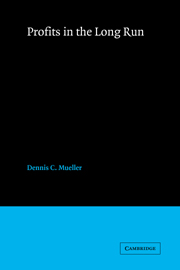Book contents
- Frontmatter
- Contents
- Acknowledgments
- 1 The persistence of firms
- 2 The persistence of profits above the norm
- 3 The persistence of market power
- 4 Profitability and market structure
- 5 The results in perspective
- 6 Profitability and the firm's own advertising, patent activity, risk, and other characteristics
- 7 Profitability and managerial control and compensation
- 8 Mergers and profitability
- 9 Mergers and market share
- 10 The threads gathered and conclusions woven
- Appendix 1 Companies studied
- Appendix 2 Industry categories
- Appendix 3 Industry matchings
- Appendix 4 Assets acquired data (Chapter 7)
- Appendix 5 Mergers and market share: samples of merging companies
- Notes
- References
- Index
7 - Profitability and managerial control and compensation
Published online by Cambridge University Press: 04 May 2010
- Frontmatter
- Contents
- Acknowledgments
- 1 The persistence of firms
- 2 The persistence of profits above the norm
- 3 The persistence of market power
- 4 Profitability and market structure
- 5 The results in perspective
- 6 Profitability and the firm's own advertising, patent activity, risk, and other characteristics
- 7 Profitability and managerial control and compensation
- 8 Mergers and profitability
- 9 Mergers and market share
- 10 The threads gathered and conclusions woven
- Appendix 1 Companies studied
- Appendix 2 Industry categories
- Appendix 3 Industry matchings
- Appendix 4 Assets acquired data (Chapter 7)
- Appendix 5 Mergers and market share: samples of merging companies
- Notes
- References
- Index
Summary
Background
Since the time Berle and Means ([1932] 1968) first emphasized the importance of the separation of ownership from control in the modern corporation, a phenomenon that today goes under the rubric of principle-agent-problem, a large literature has evolved exploring what managers can do and have done with the discretion they now have. (For surveys of this literature, see McEachern 1975, Chapter 2; Hay and Morris 1979, Chapters 8, 9; Marris and Mueller 1980; Lawriwsky 1984.) By and large, this literature has presumed the existence of pecuniary or nonpecuniary managerial objectives in conflict with the stockholder's presumed objective of the maximization of profits or the present value of the firm.
The pioneering article suggesting a tradeoff between profits and a managerial objective might be regarded as Scitovsky's (1943) classic paper on profits maximization. Although not intended as a contribution to the managerial literature, Scitovsky posited an inverted-U relationship between profits and leisure for the entrepreneur (see Figure 7.1). Given a normal utility function with leisure and income (profit) as arguments, the utility maximization, leisure-income tradeoff involves more leisure and less profits than pure profits maximization. Scitovsky used this figure to draw out the implication that profits maximization implied that leisure was on the borderline of being an inferior good for the entrepreneur, an implication suggesting the implausibility of a narrow definition of profits maximization, even in an entrepreneurial world.
- Type
- Chapter
- Information
- Profits in the Long Run , pp. 143 - 165Publisher: Cambridge University PressPrint publication year: 1986

